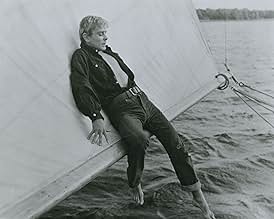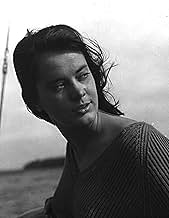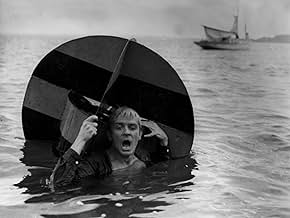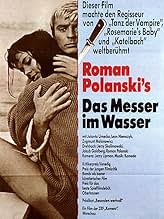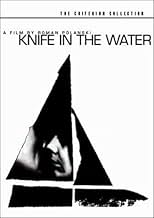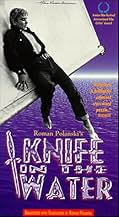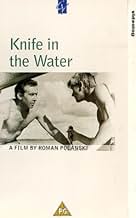NOTE IMDb
7,4/10
25 k
MA NOTE
En route pour un voyage en bateau, un homme et une femme âgés invitent un jeune auto-stoppeur emphatique.En route pour un voyage en bateau, un homme et une femme âgés invitent un jeune auto-stoppeur emphatique.En route pour un voyage en bateau, un homme et une femme âgés invitent un jeune auto-stoppeur emphatique.
- Réalisation
- Scénario
- Casting principal
- Nommé pour 1 Oscar
- 1 victoire et 2 nominations au total
Anna Ciepielewska
- Krystyna
- (voix)
- (non crédité)
Roman Polanski
- Young Man
- (voix)
- (non crédité)
Avis à la une
Roman Polanski's first full length feature is a simple, minimalist piece filled with male posturing, dead end situations, claustrophobic environments and eerie calm. This is part of Polanski's art house beginnings, but many of its themes and much of its style would be carried through to his later, more accessible work.
Like many a Polanski picture, Knife in the Water shows us men competing over a woman. Typically however this is to the end of making the men look ridiculous rather than objectifying the woman. Here the competition is the central theme, and the bulk of the film is basically a series of set pieces in which the middle-aged husband and the young hitchhiker attempt to outdo each other or show the other up. This drama is concentrated and focused by having only the three characters, and confining the action almost entirely to one location. This kind of minimalism is a safe, simple way to make a straightforward, uncluttered story a good strategy for an up and coming director but it's a lot harder to make a really great picture out of such simple elements, and the young Polanski does fall somewhat short here.
What Polanski does have is his natural talent and feel for cinematic form. His sense of rhythm was evident from his earliest shorts, and by this point he had clearly settled upon a style of slow, even paces, letting scenes take as much time as they needed and never being afraid to hold a shot into so-called "dead time" if he felt it was necessary. Often, the stillness of Polanski's pictures could build up a greater feeling of dread or tension than speed and shocks. Here, the pace is leisurely, in tune with Komeda's breezy jazz score, a sound synonymous with early Polanski. It may be slow but Knife in the Water has great atmosphere.
Another of Polanski's strengths was in his feel for space, particularly confined space. In Knife in the Water we have a kind of contradiction on this level, because a small boat in the middle of a lake is both a very wide open space and a small confined one. You kind of get half the effect of a later Polanski picture such as The Tenant you do get the sense that the characters and the camera itself are incredibly restricted in their environment, but of course you don't get that feeling of all the walls pressing in on you. Nevertheless, Polanski was a master at creating this sense, and he does tend to surround the camera with bits of boat or actor. There are numerous close-ups typical of the early Polanski although it's something he would drop later in his career which give a slightly surreal look to some of the shots. A particularly effective moment is the first shot of the boat drifting out across the lake with trees dotted in the background, which then cuts to a close-up of Krystyna, the wife, lying on her back filling the lower half of the frame, with the exact same background as the previous shot.
Knife in the Water is a fairly good film with some good ideas. It suffers a bit from style over substance but is well acted and well directed and is not long enough to get overly tedious. Better things were to come from Polanski once he moved out of Poland and began his English-language film career.
Like many a Polanski picture, Knife in the Water shows us men competing over a woman. Typically however this is to the end of making the men look ridiculous rather than objectifying the woman. Here the competition is the central theme, and the bulk of the film is basically a series of set pieces in which the middle-aged husband and the young hitchhiker attempt to outdo each other or show the other up. This drama is concentrated and focused by having only the three characters, and confining the action almost entirely to one location. This kind of minimalism is a safe, simple way to make a straightforward, uncluttered story a good strategy for an up and coming director but it's a lot harder to make a really great picture out of such simple elements, and the young Polanski does fall somewhat short here.
What Polanski does have is his natural talent and feel for cinematic form. His sense of rhythm was evident from his earliest shorts, and by this point he had clearly settled upon a style of slow, even paces, letting scenes take as much time as they needed and never being afraid to hold a shot into so-called "dead time" if he felt it was necessary. Often, the stillness of Polanski's pictures could build up a greater feeling of dread or tension than speed and shocks. Here, the pace is leisurely, in tune with Komeda's breezy jazz score, a sound synonymous with early Polanski. It may be slow but Knife in the Water has great atmosphere.
Another of Polanski's strengths was in his feel for space, particularly confined space. In Knife in the Water we have a kind of contradiction on this level, because a small boat in the middle of a lake is both a very wide open space and a small confined one. You kind of get half the effect of a later Polanski picture such as The Tenant you do get the sense that the characters and the camera itself are incredibly restricted in their environment, but of course you don't get that feeling of all the walls pressing in on you. Nevertheless, Polanski was a master at creating this sense, and he does tend to surround the camera with bits of boat or actor. There are numerous close-ups typical of the early Polanski although it's something he would drop later in his career which give a slightly surreal look to some of the shots. A particularly effective moment is the first shot of the boat drifting out across the lake with trees dotted in the background, which then cuts to a close-up of Krystyna, the wife, lying on her back filling the lower half of the frame, with the exact same background as the previous shot.
Knife in the Water is a fairly good film with some good ideas. It suffers a bit from style over substance but is well acted and well directed and is not long enough to get overly tedious. Better things were to come from Polanski once he moved out of Poland and began his English-language film career.
While driving to sail with his wife Krystyna (Jolanta Umecka) in his yacht, the arrogant and wealthy Andrzej (Leon Niemczyk) "stumbles" with a drifter (Zygmunt Malanowicz) in front of his car hitchhiking on the lonely road. Andrzej gives a ride to the young man with despisal. When they reach the marina, Andrzej unexpectedly and without any reason invites the young man to sail with them, initiating a tense dispute of power with the youth, in a claustrophobic and erotic environment.
"Nóz w Wodzie" is a claustrophobic, tense and erotic little movie of the earlier career of Polanski. The simple story is supported by a magnificent cinematography and camera work with unusual angles, and great performances of the lead cast. The Brazilian DVD shamefully misses many subtitles, leaving without translation many sentences in the dialogs. I immediately recall at least two movies that used concepts of this screenplay: "Dead Calm" and the open end of Adrian Lyne"s "Unfaithful". My vote is seven.
Title (Brazil): "Faca na Água" ("Knife in the Water")
"Nóz w Wodzie" is a claustrophobic, tense and erotic little movie of the earlier career of Polanski. The simple story is supported by a magnificent cinematography and camera work with unusual angles, and great performances of the lead cast. The Brazilian DVD shamefully misses many subtitles, leaving without translation many sentences in the dialogs. I immediately recall at least two movies that used concepts of this screenplay: "Dead Calm" and the open end of Adrian Lyne"s "Unfaithful". My vote is seven.
Title (Brazil): "Faca na Água" ("Knife in the Water")
WELL,you can defined this great film just by one particular scene: the old man is rich,have good social position and took the boy on board to play the role of his mentor.However the young man was dragging the beautiful knife,which was_as he claimed_ the most important thing in his life.The guy was always playing the knife between his fingers and the old man was jealous about that.So when the boy went inside the yacht leaving the knife,the old man took the knife and tried to do the same.Suddenly the young appear and saw this.The only way for the old man to get away with some honour was to allow the boy do the play:he played the knife between the old man's fingers,looking straight into his eyes.Well the lady at the same time was swimming using a funny rubber cocodrile.So, imagine this beautiful scene with the knife,all the tension and suddenly we hear the woman shouting:'Andrzej, Andrzej,the cocodrile is making the bubbles',huh,when I was in the cinema the whole audience burst laughting after hearing that!. The woman stays in the background, just think why? There's another great funny shot when the woman lays there for a sunbathe with her small bikinis,well, her breast dominates the scene!. is the waving movement of the yacht who creates the sensual scene!.
Of course this scene was part of the longer plot ,the critics described this `knife scene' as the most famous and symbolic scene in all of Polanski films..Zygmunt Malanowicz,the actor who played the part of the young man said that he practice a lotnfor those scenes,polanski was afraid if he was prcticing long enough,finally everything was Ok.As Leon Niemczyc,the actor who played the mature role said" Malanowicz only gave me sligh scars'.The idea of the film was the strange competition between this two men.the jury and the prize was the woman.Polanski said he needed a actress that looked plain and normal in ordinary dress but intriguing in bikini!.
Polanski was not only interested in this kind of personages,he likes the relantionship between' the master and the servant' The domineering and the repressed ,as we can see in his short film' The Fat and the Lean' (1961, B&W, 15mins) or in features like Knife in the Water (1962); Cul-de-sac (1966);Dance of the Vampires(1967) etc.
Of course this scene was part of the longer plot ,the critics described this `knife scene' as the most famous and symbolic scene in all of Polanski films..Zygmunt Malanowicz,the actor who played the part of the young man said that he practice a lotnfor those scenes,polanski was afraid if he was prcticing long enough,finally everything was Ok.As Leon Niemczyc,the actor who played the mature role said" Malanowicz only gave me sligh scars'.The idea of the film was the strange competition between this two men.the jury and the prize was the woman.Polanski said he needed a actress that looked plain and normal in ordinary dress but intriguing in bikini!.
Polanski was not only interested in this kind of personages,he likes the relantionship between' the master and the servant' The domineering and the repressed ,as we can see in his short film' The Fat and the Lean' (1961, B&W, 15mins) or in features like Knife in the Water (1962); Cul-de-sac (1966);Dance of the Vampires(1967) etc.
Knife in the Water is the debut feature film from Polish director Roman Polanski. It is a very minimalist film, shot in black and white, and spoken in Polish. It isn't much by you have to start somewhere. The film is about a rich writer and his young wife. They are going sailing for the day, but on the way to the docks they pick up a hitchhiking student whom we never learn the name of. They allow the student to accompany them on their day tour of the lake, a decision they will forever regret. Tensions start to slowly boil on the boat as relationships grow more and more heated. Almost the entire film takes place on the boat and these three are the only people in the whole movie. It is the definition of minimalist filmmaking in looks, as well as content.
Knife in the Water is, for lack of a better word, dull. Not much happens and I never feel like this film is going anywhere. It is a mere 94 minutes, but the first 70 of those minutes seem to be useless and mundane. There are moments when you think it is going to pick up, but it never really does. It is a slow film that chronicles every little moment of this trip to sea and it eventually grows tiresome to just watch these characters rig up ropes, steer the boat, cook food, eat food, play games, etc. The film does start to pick up in about the last twenty minutes as events start shaking up the story so that it can come to a vague resolution. And yet the film still lacks any kind of "aha!" moment and is devoid of any real wow! factor.
The film's central focus is on the relationship between the three characters on the book so most of the action is meant to develop the characters. The development is just as slow as everything else, however. We get to know these characters very well, but in the end we sort of regret it. There isn't much to know about these people and their stories lack any sort of intrigue. When I finally started to figure out these people I was hit with a faint breeze of anticlimactic. Then things begin to pick up, slow down again, become mildly interesting, then the film ends. And then as the screen fades to black I sort of just shrugged my shoulders and walked away.
You could argue that there is a lot of subtext here with lots of things open to interpretation. The film is vague in location, time, and character background, so there is a certain amount of this film that you could interpret in all sorts of bizarre and far fetched ways. Personally, I don't see it. I realize where a lot of the deeper prying into the film comes from. People want to see a lot more in this film than what I believe is actually there. What I did feel was a certain amount of tension that was underlying the entire film in a very discreet and possibly non existent way. Again, I feel like I was expecting something more to this film than what was actually there, thus the tension and uneasiness was all fabricated in my mind. This is just a weird movie to wrap your head around, and it doesn't seem to amount to much in the end.
Knife in the Water left me expecting a lot more. It just isn't an incredibly fascinating film. It isn't a bad film, but it isn't that great and I definitely wouldn't watch it again. I like Roman Polanski a lot and so I was really interested to see his very first feature film so it was pretty disappointing to see what little his first feature amounted to. If I had seen this in 1962 I probably wouldn't have thought much of Polanski, but of course I know how renowned he is in 2011, so Knife in the Water in no way hurts my opinion of the man's work.
Knife in the Water is, for lack of a better word, dull. Not much happens and I never feel like this film is going anywhere. It is a mere 94 minutes, but the first 70 of those minutes seem to be useless and mundane. There are moments when you think it is going to pick up, but it never really does. It is a slow film that chronicles every little moment of this trip to sea and it eventually grows tiresome to just watch these characters rig up ropes, steer the boat, cook food, eat food, play games, etc. The film does start to pick up in about the last twenty minutes as events start shaking up the story so that it can come to a vague resolution. And yet the film still lacks any kind of "aha!" moment and is devoid of any real wow! factor.
The film's central focus is on the relationship between the three characters on the book so most of the action is meant to develop the characters. The development is just as slow as everything else, however. We get to know these characters very well, but in the end we sort of regret it. There isn't much to know about these people and their stories lack any sort of intrigue. When I finally started to figure out these people I was hit with a faint breeze of anticlimactic. Then things begin to pick up, slow down again, become mildly interesting, then the film ends. And then as the screen fades to black I sort of just shrugged my shoulders and walked away.
You could argue that there is a lot of subtext here with lots of things open to interpretation. The film is vague in location, time, and character background, so there is a certain amount of this film that you could interpret in all sorts of bizarre and far fetched ways. Personally, I don't see it. I realize where a lot of the deeper prying into the film comes from. People want to see a lot more in this film than what I believe is actually there. What I did feel was a certain amount of tension that was underlying the entire film in a very discreet and possibly non existent way. Again, I feel like I was expecting something more to this film than what was actually there, thus the tension and uneasiness was all fabricated in my mind. This is just a weird movie to wrap your head around, and it doesn't seem to amount to much in the end.
Knife in the Water left me expecting a lot more. It just isn't an incredibly fascinating film. It isn't a bad film, but it isn't that great and I definitely wouldn't watch it again. I like Roman Polanski a lot and so I was really interested to see his very first feature film so it was pretty disappointing to see what little his first feature amounted to. If I had seen this in 1962 I probably wouldn't have thought much of Polanski, but of course I know how renowned he is in 2011, so Knife in the Water in no way hurts my opinion of the man's work.
Polanski's first feature. Hmmmmm..... This film is a study of macho rivalry, sexual tension and establishing who is the alpha male. I felt strangely unfulfilled after the film, I guess I was expecting something darker or more serious to happen, but it never did.
Don't get me wrong there is some excellent acting by the Polish cast as well as some innovative camera work. The tension between the rich, older Andrzej and the exuberant, free spirited young man (you aren't told his name) is evident from the first time they meet. This carries over on to the boat where Andrzej takes every opportunity to play captain, ordering the young man around in an attempt to demean and humiliate him. Eventually things turn to hostility with the young attractive wife trying to placate the two.
Not bad for a first feature, a good springboard for Polanski as we all know he went on to better things from here.
Don't get me wrong there is some excellent acting by the Polish cast as well as some innovative camera work. The tension between the rich, older Andrzej and the exuberant, free spirited young man (you aren't told his name) is evident from the first time they meet. This carries over on to the boat where Andrzej takes every opportunity to play captain, ordering the young man around in an attempt to demean and humiliate him. Eventually things turn to hostility with the young attractive wife trying to placate the two.
Not bad for a first feature, a good springboard for Polanski as we all know he went on to better things from here.
Le saviez-vous
- AnecdotesThe first scene in the film shows Andrzej and Krystyna driving a car. As shooting from the platform in front of the car was not yet available, the crew was tied to the car, standing on its mask. To get the proper light effects, they held a blanket with a small hole for the camera. Leon Niemczyk (Andrzej) was really driving this car quite fast (this was crucial to this scene), but he couldn't see anything. He drove the car using the tops of the trees to imagine where the road is.
- GaffesWhen the young boy is trying to stabilize the Christine by hanging off its side, the railing of the camera boat can be seen in the lower left-hand corner of the screen.
- ConnexionsEdited into Spisok korabley (2008)
Meilleurs choix
Connectez-vous pour évaluer et suivre la liste de favoris afin de recevoir des recommandations personnalisées
- How long is Knife in the Water?Alimenté par Alexa
Détails
- Durée
- 1h 34min(94 min)
- Couleur
- Mixage
- Rapport de forme
- 1.37 : 1
Contribuer à cette page
Suggérer une modification ou ajouter du contenu manquant

